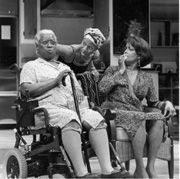PLAYS ABOUT FAMILY gatherings can demand the same kind of benevolent patience it takes to get through family gatherings in life; you have to sit there calmly rolling your eyes during the cringing bits if you’re going to receive the rewards of the wrecked affection coursing beneath the event. You know you’re in for someone crying foul on someone else’s delusions, for children telling parents they never felt loved, and for a whole truckload of secret hurt. Yes, in Jar the Floor, a birthday party spent with the distaff side of an African-American clan, playwright Cheryl L. West hurls a lot of pretty obvious dysfunction your way. But the best response to the Rep’s current production of it is to sigh Well, all right, then through clenched teeth and get out of it what you can—which, if you’re open to it, is a night of pleasant strife.
Jar the Floor
Seattle Repertory Theater ends October 28
MaDear (Marilyn Coleman) is turning 90, and, though sharp, she has a tendency to rail at her dead husband and mortify her caretakers: upwardly mobile granddaughter MayDee (Sharon Washington), a professor waiting for a call about her possible tenure, and daughter Lola (Emily Yancy, a real ball of fire); MayDee’s mother, a vain hellion waiting for a call from yet another gigolo; and there’s great-granddaughter Vennie (Terrilynn Towns), too, and I don’t suppose it will surprise anyone to learn that she’s pierced, peeved, and possibly lesbian, and arrives with—oh, yes, friends—a cancer-stricken white girl (Alexis Chamow) in tow.
West doesn’t strike any new ground, but she has a true ear for the dramatic and comic dialogue of familial unrest. She’s not playing any favorites here, and everybody moves under their regret with a remarkably familiar stoicism, releasing some of the pain with a sniping nonchalance. Her constructions are matched by director Gil McCauley, who keeps the attacks moving with ease and, better, imbues his fine cast with an electric sense of that malignant comfort that allows blood relations to casually, deeply cut one another while heading obliviously onward.
The humor and simmering regret are so engaging as far as they go, in fact, that you wish West had avoided pushing things a tad further here and there (the senile great-grandmother possibilities prove too tempting), and that McCauley hadn’t jumped right beside her with his own earnest shoving. A smashed mirror is, forgive me, reflective metaphor and then some, and someone has to answer for Coleman’s puzzlingly lipsticked ecstasy at the show’s close. I’m going to remain mute about the Terribly Brave mastectomy monologue that hits you right in the face near the top of Act II (cue the teeth clenching); Chamow, in cloying, smiling-through-tears disarray, is the big victim of both West’s and McCauley’s slight excesses.
When things are going well on stage, however, which is often, the production crackles divertingly. The actors really have at it—smooth, steely Washington and, especially, the keenly responsive Towns have true bite—and the whole affair flies by, much fleeter than an evening with your own extended folks could ever hope to be.








